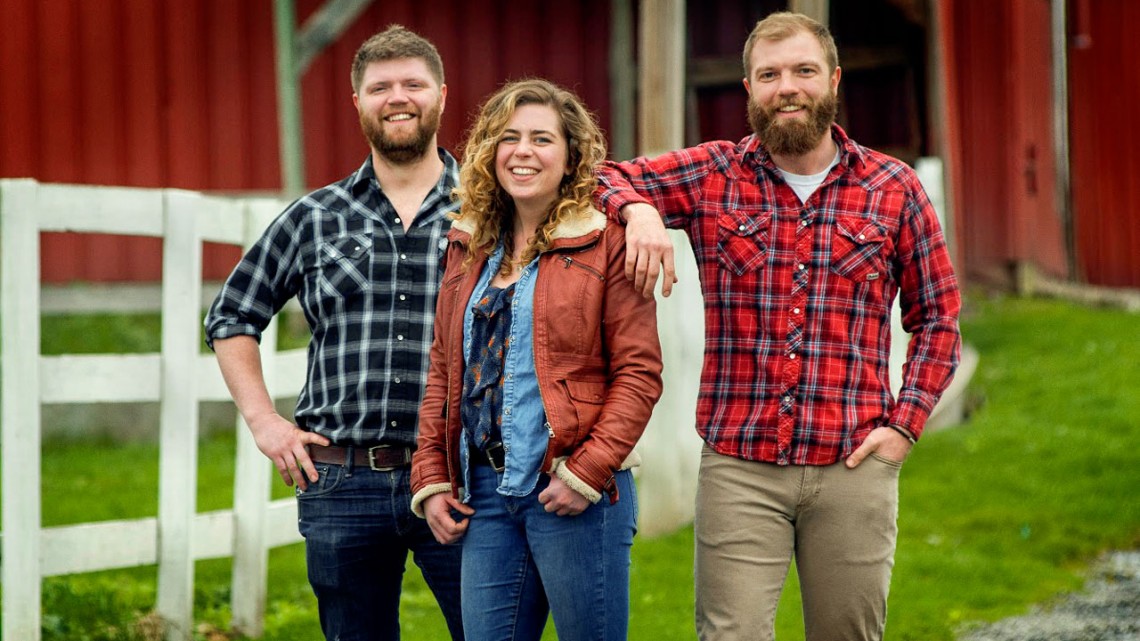
Lively Run Goat Dairy owners, from left Pete Messmer, Katie Shaw and Dave Messmer ’17, at the Messmer’s family’s farm in Interlaken, New York.
Say cheese: Local dairy donating to food banks
By Linda Copman
Lively Run Goat Dairy of Interlaken, New York, co-owned by Dave Messmer ’17, is doing its part to help those in the region struggling during the COVID-19 pandemic.
Messmer, an alumnus of the Dyson School of Applied Economics and Management, and Lively Run are purchasing milk from upstate New York dairies that would otherwise be dumped due to low demand caused by the pandemic and turning it into cheese, which the dairy is donating to local food banks.
The dairy launched a Go Fund Me campaign April 17 to raise $20,000 with which to purchase surplus milk and to cover cheese production costs. The campaign met that goal in three days; as of May 4, Lively Run had raised $44,267 from 704 donors on their Go Fund Me page, plus $5,000 in mailed-in donations.
The dairy expects to donate about 7,000 pounds of cheese with the funds raised to date.
On April 27, New York Gov. Andrew Cuomo announced that the state will work with dairy producers to make products from surplus milk and donate the products to food banks, through the Nourish New York Initiative. The initiative will also distribute $25 million to food banks across the state.
“We are thrilled that New York state is implementing this idea,” said Katie Shaw, marketing coordinator and business partner at Lively Run. “We have already begun production of cheese from surplus milk, made donations of products to local food banks and set up a nonprofit organization.”
The dairy is consulting with Anke Wessels, a visiting lecturer at Dyson and executive director of the Center for Transformative Action at Cornell. CTA is providing fiscal sponsorship to expand the project by enlisting cheese production partners and engaging more farmers in an effort to increase donations.
Pete Messmer, Dave’s brother and head cheesemaker at the dairy, also consulted with Rob Ralyea, senior extension associate in the Department of Food Science, to ensure that the project complies with regulatory standards.
“Rob helped us figure out the licensing with New York state, which was the most challenging aspect of the project for us,” Shaw said. “He is now helping us network with additional cheese producers, whom we will partner with to make more cheese, so we can feed more hungry people.”
So far, Lively Run has been buying surplus milk from Hidden Pastures Goat Dairy, in northern New York. The Lively Run team is working with Cornell Cooperative Extension to identify additional dairy farms that have excess milk.
At the onset of the pandemic, Lively Run instituted daily management team meetings, with Dave and Pete Messmer, parents Steve and Susanne, and Shaw.
“Our dairy friends sent us photos of milk being dumped in their manure pits, and we had been seeing articles in the news about farmers dumping produce and milk because of oversupply,” Shaw said. “We were lamenting the plight of New York dairy farms and began brainstorming how we could help them.”
“Having well-developed communication lines in our organization through our daily meetings enabled us to pivot quickly to meet the needs of the new marketplace,” Dave Messmer said. “We are thrilled to be able to use our resources to help our community during this difficult and tragic pandemic.”
The dairy has a long history of donating cheese to area food banks, and Robert Theetge, one of Lively Run’s cheesemakers, volunteers regularly at a local food pantry. These relationships helped the management team understand the needs of area food banks and use their network to get their cheese donations distributed across the region.
So far, cheese has been dispersed to the Interlaken Food Pantry, South Seneca Food Pantry, Trumansburg Food Pantry, Lodi Food Pantry, Auburn Hunger Task Force and the PressBay Friendship Food Pantry in Ithaca.
“We will build our distribution network outward from Lively Run,” Shaw said. “We want to ensure that we serve surrounding towns and keep Tompkins, Seneca and Schuyler counties at the forefront.”
The dairy has reserved a small portion of the cheese produced to give to those who contributed funds, as a thank-you.
“The response we’ve seen from the community is staggering,” Messmer said. “This project has proved to me, yet again, that people really care about helping one another.”
Linda Copman is a writer for Alumni Affairs and Development.
Media Contact
Get Cornell news delivered right to your inbox.
Subscribe


